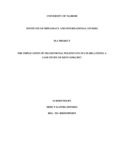| dc.description.abstract | In the recent past Kenya has undergone changes in its political dispensation through the five-year interval polling system. The frequency of government change, higher than that of the pre-multiparty era that effectively began in 1992 has sometimes destabilized Kenya's political relations with its neighbors in East Africa and the rest of the world. This has had an effect on political institutionalization which involves creation of formal stable structures that embody a political system across a population. This study was conducted to determine how the transitional politics in Kenya affect the state of the relationship between Kenya and other African states. The study was guided by the following specific objectives; to assess the effect of political institutionalization on the relationship between Kenya and other African states and to establish how regime interests in Kenya affect the country’s relationship with other African states.
The study was guided by the International Relations theories of Institutionalism Liberalism. Institutionalism theory draws from microeconomic theory and game theory and argues that co-operation between nations is possible due to underlying self-interests. This study used secondary qualitative data. Secondary data is data obtained by someone other than the user of that information for a purpose different from that meant by the user. The researcher used data from secondary documents such as text books on Kenya's international relations, from past research papers at the postgraduate library at the University of Nairobi's Jomo Kenyatta Library, and other research papers published internationally. The study also sourced information from reports and from local dailies.
From the findings discussed study made the following conclusions. First, the relation between Kenya and other African countries vary but build around the general principles of peaceful existence with African countries; quiet resolution of interstate contentions; promotion of regionalism; respect for the balance of power and regional integrity of states; respect for international standards, traditions and law; and adherence to non-alignment. The variations occur due to political institutionalization in Kenya. The weak institutionalization contributes to the direction relations with other African states takes. Weak political institutionalization means the political institutions in Kenya are still unstable as a result of the transition politics as Kenya makes steps towards democratization. Political parties keep changing after every election and with change in leadership. The changes have an effect on the direction leadership takes regarding other countries. However, the relations seem not to be outside the general direction of international relations.
The study recommends that political institutions in Kenya must be strengthened by according then constitutional entrenchment, independent access to financing and freedom from political interference. These institutions include presidency, judiciary, the national assemble and the commissions. With strong institutions, Kenya's internal political environment will take a definite and predictable shape, enabling Kenya to be predictable over issues that will arise from the international scene. It is necessary for parliament to have independence from the overbearing control from the president of the day. This is because, though being in parties, members of parliament represent the people's voice. A stable and independent parliament will focus on articulating issues affecting the citizen as opposed to serving the president's needs. | en_US |



